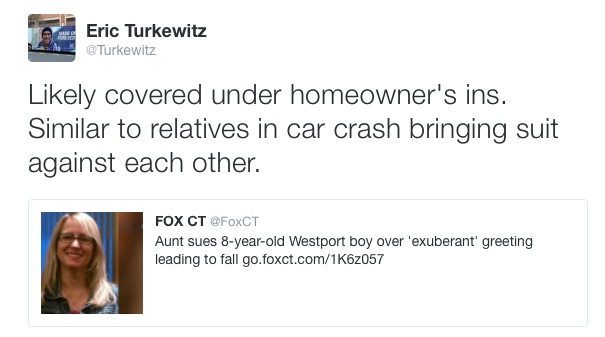 (A version of this post appears at The Hollywood Reporter. It is cross-posted here.)
(A version of this post appears at The Hollywood Reporter. It is cross-posted here.)
Charlie Sheen got himself into a pickle. I know, you’re all shocked! The question we try to answer today, just how big is his pickle?
The nature of his confession is that he is now HIV-positive, that he has known this for four years, and that while knowing he was HIV-positive he had sex with many women. This includes prostitutes and porn actresses. He claims that he told all the women about the HIV.
But at least one of them, former porn actress and girlfriend Bree Olson, claims she was never told. Sheen said that ain’t true. He also claims that at least one other has been blackmailing him to the tune of $10 million, telling him to pay up or she would release the information.
What we call this back East is a big, fat headache. We call it other names too, starting with “cluster” and ending with the likely source of Sheen’s illness, but I’ve been told to keep this piece clean.
Since I practice civil law, I’ll tackle this cluster-intercourse from that end with five easy questions. And since the women may be anywhere in the country, and Sheen travelled widely (and wildly), a claim could theoretically pop up in any jurisdiction.
I’ll use New York law as my baseline, since that’s where I practice. It also happens to be almost identical to California law in important respects, where Sheen resides. But, as you’ll see below, I don’t think it will matter much anyway where any suit is brought.
- Do any of the women have a negligence claim against Sheen for scaring the bejesus out of them with his HIV revelation?
In general, you can’t bring a claim purely for the negligent infliction of emotional distress in New York. “That car almost hit me, I was so scared!!!!!” doesn’t cut it, no matter how many exclamation marks you use.
There are a few small exceptions where a purely emotional injury could result in a claim, of which the desecration of a body is one, and the potential infection with HIV happens to be another. Thus, someone getting stuck with an infected needle due to negligence could result in a claim. It will most likely be six months before she knows if she was infected and there is little doubt a reasonable person would be anguished over it.
In order to prove negligence in the Sheen scenario, a woman (presumably) would have to come forward to say that Sheen breeched a duty of care to her because he knew of his diagnosis, and that he reassured her he was clean, and that they therefore didn’t use a condom. If a jury believed her — and remember that this is unlikely to be a nun that is testifying — a claimant could theoretically get over that hurdle.
But that is not the only hurdle. The woman will also have to prove that her mental injury is “a direct, rather than a consequential” result of the breach of a duty of care to her and that the claim “possesses some guarantee of genuineness.”
The problem is that it’s four years later. What direct injury? Remember, this is mental anguish only. Simple blood tests, if she hasn’t already had them, will give her peace of mind. The “guarantee of genuineness” is missing from the very tough New York rules against such claims.
But let’s say this was not someone in the porn or sex-work industry who might get tested often, but just a regular girl that liked the boy and they had good times together. Hey, it’s possible!
A claim now? Getting closer, but only if this was unprotected sex that occurred very recently, giving rise to a reasonable cause for AIDS phobia.
(California likewise has strict limits on suits regarding the negligent infliction of emotional distress.)
2. Even if a woman can elucidate a claim, does she bear any responsibility?
In New York we have something called comparative negligence. So too does California. If you’re in a car collision and sue, the jury gets to determine not only the fault of the guy you sued, but yours also. If they find you 25% responsible, you say goodbye to 25% of any jury award.
Here you got comparative negligence up the wazoo: A wild guy having sex with lots of different people. There is a heavy element of personal responsibility that goes on here not just from his point but from hers.
And a jury, if it were to actually reach the issue, would most likely wag a metaphorical finger at the woman and say:
“You had unprotected sex with Charlie Sheen?! CHARLIE DEGERERATED SHEEN! ARE YOU OUT OF YOUR FUCKING MIND?!”
Yeah, I know I said I wouldn’t use that word, but good grief, think about that concept. The comparative negligence would be pretty darn high.
- OK, if negligence is out, how about suing for intentional infliction of emotional distress?
While this sounds like a better plan that suing under a negligence theory, the bar is still very, very high to prevail. The New York standard to prevail on that theory is:
“One who by extreme and outrageous conduct intentionally or recklessly causes severe emotional distress to another is subject to liability for such emotional distress.”
The problem with that is that there isn’t any evidence to show he tried to cause distress. By their own admissions, the women have to acknowledge that this was kept secret from them until he gave his recent interview. Is it possible? Yeah, maybe.
4. Are there any damages?
In the unlikely event someone could prove Sheen was liable, how will she prove that a reasonable person would be fearful if the contact happened more than six months ago and she is HIV-negative when tested now? And even if she could prove that a reasonable person would nevertheless be fearful, just how big could the injury be?
The jury will likely be instructed by a court to view how the reasonable person of average sensibilities could be affected under the circumstances. Blood test. Done. Relief. Go have a beer.
Could there be punitive damages if found liable for intentional causing the injury? While possible, the road is very long to get there, and with little in the way of compensatory damages, might not be viewed favorably by many courts.
5. Wait! Before you sum up! What about the extortion of $10 million?
In theory, if the extortionist were the one to sue, and in Bizzarro World — which doesn’t exist in our courts no matter what kind of headlines you might read — had a verdict rendered in her favor, a good argument could be made that the blackmailed dollars would be used as a set-off. But good luck proving it.
The only way the extortion issue comes into play is if some prosecutor says, “Hey, I bet a lot of cash was used for that!! Let’s follow the money to see if Sheen was breaking the law with respect to documenting transfers of cash over $10,000.”
But I’ll let the criminal defense lawyers and prosecutors discuss that.
Summation time! In the event a woman was able to surmount every single hurdle and survive motions to dismiss, what would the jury likely do?
They’d likely look at the rather motley array of witnesses that were presented, hate them all up, down and sideways, say a pox on you and your houses, you all get nothin’ and we’re going home to our families.
And frankly, they are likely to say that no matter where the suit was brought.






